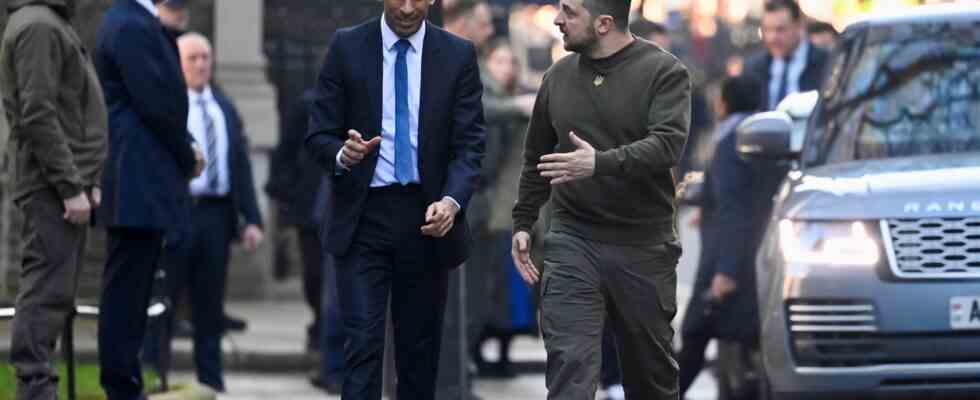Status: 02/26/2023 2:57 p.m
After the war began, Great Britain delivered arms to Ukraine earlier than other countries. The support from London also has historical reasons – and is useful domestically.
On February 8, the President of Ukraine addressed members of the British Parliament in Westminster Hall. A moment full of symbolism, also pathos. And a moment when it became clear that the close ties between Great Britain and Ukraine are not only about financial donations and tank supplies.
There, Volodymyr Zelenskyy said that he had of course also visited the bunker from which Winston Churchill controlled the country’s fortunes during the Second World War. A museum employee allowed him to sit at Churchill’s table.
There, said Selenskyj, he also felt something. But it’s only here, in front of the deputies, that he realizes what he feels: “It’s the feeling of bravery leading us through the most difficult moments, only to reward us with victory in the end.”
These are drastic words that may sound too martial for German ears, but which the British can relate to. Supporting Ukraine, including with arms, is almost uncontroversial in the UK. It’s about Ukraine’s struggle for freedom – just like the British struggle against Nazi Germany.
Johnson’s promise
The closeness between the Ukrainian leadership and the British government has to do with the personalities at the top and their relationships with one another.
Boris Johnson and Selenskyj – the two obviously got along very well, also on a human level. Johnson traveled to Kiev early on, becoming the first foreign head of government to address the Ukrainian parliament.
His repeated promise: “However long it takes, the UK will stand by Ukraine.”
And Britain provided funding and arms early on, while other countries were still debating arms supplies. Zelenskyy was also able to overlook the fact that the British government was hesitant to implement sanctions against Russian oligarchs who support Putin and have invested in London.
Sunak’s initiative
By mid-January, Britain had provided Ukraine with arms and aid worth around 8.3 billion euros. For comparison: Germany delivered weapons and relief supplies and made support payments totaling 6.2 billion euros, as documented by the Kiel Institute for the World Economy.
The British government gave the final impetus to the debate on tank deliveries when Prime Minister Rishi Sunak announced that he would deliver 14 Challenger II main battle tanks. A number that could soon be overtaken by German supplies, but Britain was pushing for the political breakthrough.
The benefit by the way
Johnson himself always used the offensive Ukraine policy – to distract from scandals and to underline the global political importance of the United Kingdom. Sunak, the new prime minister, continues on this course.
He brought Zelenskyj to London, he arranged the deal with the Ukrainian president to link Ukraine’s demand for fighter jets with the announcement that the British army is now training Ukrainian pilots.
“My message here is to do the same as the UK and significantly increase aid to Ukraine,” Sunak recommended at the Munich Security Conference. It remains the same under the new prime minister: Great Britain sees itself as a close ally of Ukraine and a driver in the Allied camp.
Pretty best friends – Ukraine and UK
Christoph Proessl, ARD London, February 24, 2023 1:25 p.m

